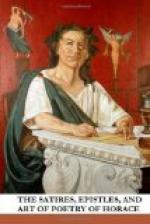Page 94.
And each man’s lips are at his neighbour’s ear.
Perhaps a recollection of Pope’s line (Satires of Dr. Donne), “When half his nose is in his prince’s ear.”
PAGE 98.
Of studying truths that
rick and poor concern,
Which young and old
are lost unless they learn.
This may seem borrowed from Cowper’s “Tirocinium,”
—truths on which depend
our main concern,
That ’tis our shame and misery
not to learn;
but I believe the resemblance to be purely accidental.
It may serve however to show that the more serious
passages in Horace, as well as the lighter ones, are
not unlike Cowper.
PAGE 103.
That makes Atrides and Achilles foes.
Almost verbatim from a line in Pope’s “Odyssey,” which is itself probably from one in Maynwaring’s First Book of the “Iliad.”
PAGE 110.
Not to admire, Numicius,
is the best,
The only way, to make
and keep men blest.
Slightly altered from the later editions of Francis:
Not to admire is of all means the best,
The only means, to make and keep us blest.
Ten lines lower down I have a couplet nearly coincident
with one in Howes, but not intentionally so.
PAGE 124.
But what are Rhodes and Lesbos, and the rest.
This and the nine following lines are a considerable expansion of the Latin: but I was apprehensive of not bringing out the connexion, if I translated more closely.
PAGE 126.
Empedocles or the Stertinian school.
As Horace has chosen to take Stertinius here as a type of the Stoics, I thought I might avail myself of a similar licence, and call the Stoics as a school by his name.
PAGE 129.
The ox, unyoked and
resting from the plough,
Wants fodder, stripped
from elm or poplar bough.
Horace merely has “strictis frondibus:” but the writers De Re Rustica, quoted by the commentators, tell us what the leaves in use were.
PAGE 131.
When Maenius, after
nobly gobbling down
His fortune, took to
living on the town.
“Took to living on the town” is not meant as a version of “urbanus coepit haberi,” but rather as an equivalent suggested by the context.
PAGE 134.
Each law, each right, each statute and each act.
Horace’s object is evidently to give an exhaustive notion of the various parts of the law: and I have tried to produce the same impression by accumulating terms, without caring how far they can severally be discriminated.




